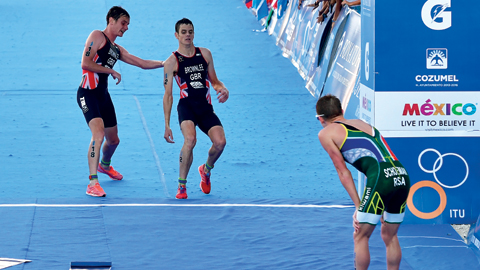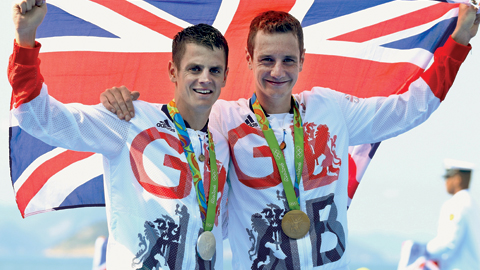Brunswick’s James Hallam and Charlie Booth dined with superstar triathletes Alistair and Jonny Brownlee. In a wide-ranging conversation, the brothers discussed being training partners – and each other’s toughest competitor
Crispy chicken. Indonesian curry. Sides of garlic bread and sweet potato fries. We’re moving glasses and plates to accommodate Alistair and Jonny Brownlee’s post-training dinner. “We try to eat a healthy, balanced diet on the whole,” says Alistair. “But you spend your life training, so you’ve got to enjoy food.”
In their native Yorkshire, where they still do much of their 35 hours a week of training, the brothers are local heroes. But if these two Olympic medalists – among the world’s best triathletes – walked past, you probably wouldn’t notice them. Six foot tall, wiry and boyish, they arrive in their matching puffa jackets and tracksuits, stopping briefly to say hello to some people they know at the next table.
“We get recognized much more since Mexico,” the 2016 Cozumel triathlon where Alistair famously had to haul Jonny over the last few meters of the course as his legs gave way, leaving him looking like “a wobbly horse” – a video viewed hundreds of thousands of times on YouTube. “Every few days I cross the street now and get people saying, ‘Make sure you drink lots of water’. I’m quite embarrassed by the whole thing. To get more recognition for losing a race than your Olympic medal, is really weird.”
The brothers are deeply connected to Yorkshire. Many of their training partners have been friends since they were teenagers. Jonny goes to their parents’ house for a roast dinner every Sunday. Their third brother, Ed, a veterinary student, can always be relied on to bring the Olympians down to earth: “He doesn’t care about triathlon at all. He could have come to Rio to watch us, but he didn’t want to.”
In an era of peripatetic athletes and footloose sports franchises, that ordinariness is part of the Brownlees’ appeal – and the counterpoint to their extraordinary achievements. At 29, Alistair has won triathlon gold in the last two Olympics and has twice been world champion. Jonny, younger by two years, has a world title of his own and followed up bronze in London 2012 with silver in Rio 2016.
Their capacity for endurance is remarkable. In the 2012 Olympic race, Alistair finished the 10 kilometer run in 29 minutes 7 seconds. That was only 96 seconds slower than Mo Farah’s time, who won Olympic gold for running the same distance on the track; Brownlee did it having already completed a 1,500 meter swim and 43 kilometer bike ride.
The training required to reach this level is predictably brutal. In addition to gym and physio sessions, they swim 20 to 25 km, cycle 500 to 700 km, and run 120 km or more every week.
While modern sports stars surround themselves with advisers, agents and coaches, the Brownlees have bucked the trend, taking responsibility for their training and race-day performance.
“I want to be stood on the start line knowing I’m completely responsible for what goes right or wrong,” says Jonny. “I’m not saying I don’t have a team – I’ve got the support of four or five people who I rely on.”


